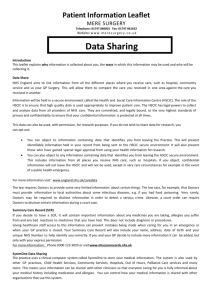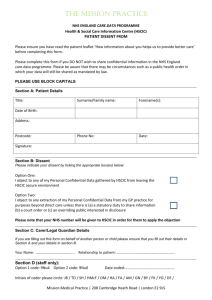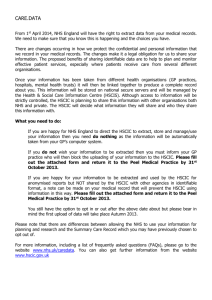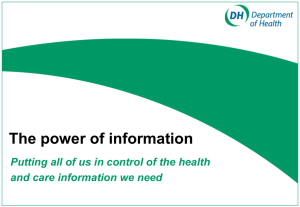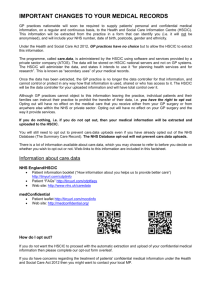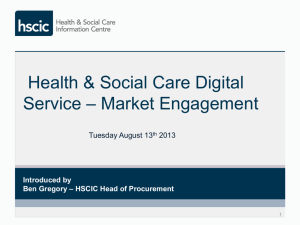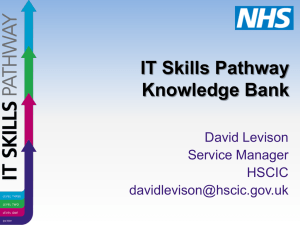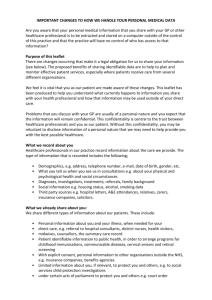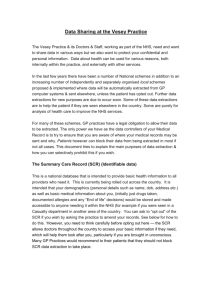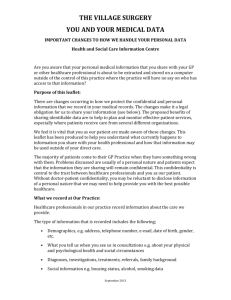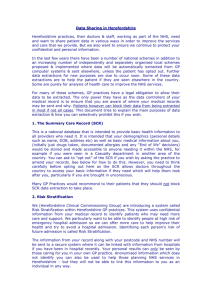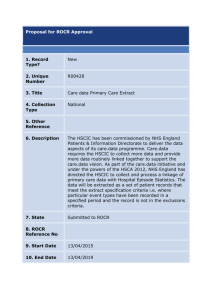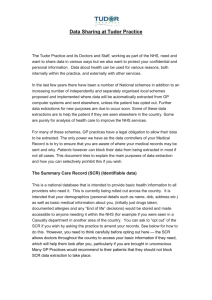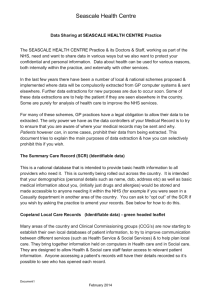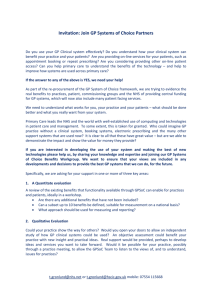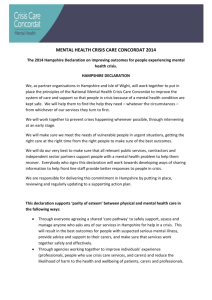Data Sharing Leaflet - The Eastney Practice
advertisement
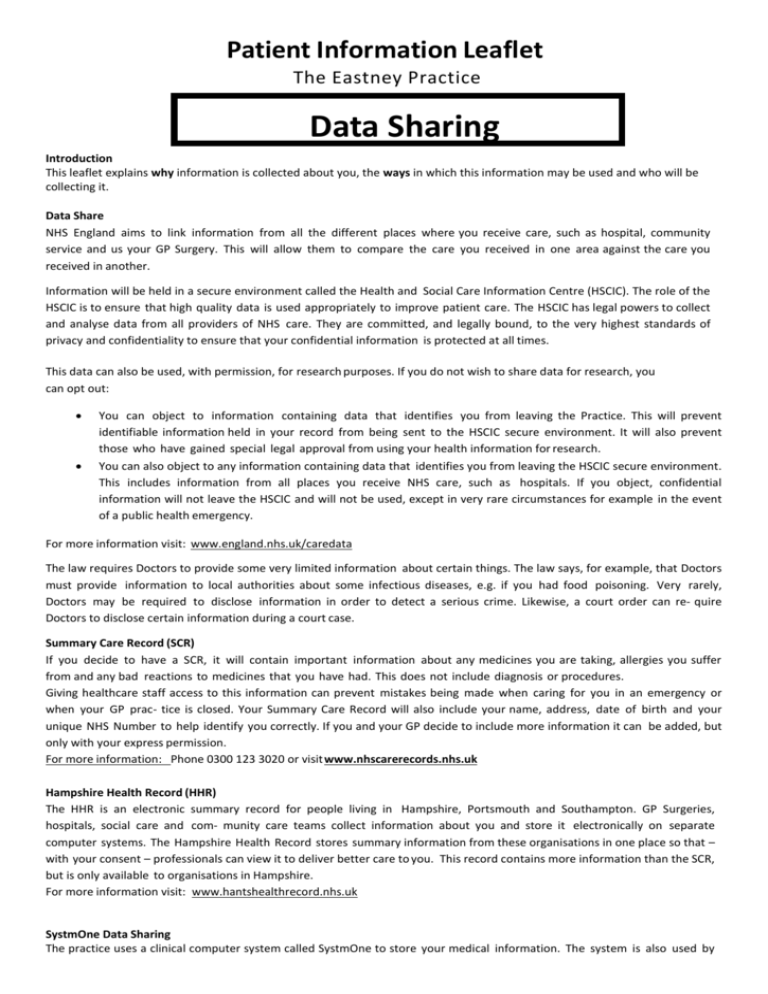
Patient Information Leaflet The Eastney Practice Data Sharing Introduction This leaflet explains why information is collected about you, the ways in which this information may be used and who will be collecting it. Data Share NHS England aims to link information from all the different places where you receive care, such as hospital, community service and us your GP Surgery. This will allow them to compare the care you received in one area against the care you received in another. Information will be held in a secure environment called the Health and Social Care Information Centre (HSCIC). The role of the HSCIC is to ensure that high quality data is used appropriately to improve patient care. The HSCIC has legal powers to collect and analyse data from all providers of NHS care. They are committed, and legally bound, to the very highest standards of privacy and confidentiality to ensure that your confidential information is protected at all times. This data can also be used, with permission, for research purposes. If you do not wish to share data for research, you can opt out: You can object to information containing data that identifies you from leaving the Practice. This will prevent identifiable information held in your record from being sent to the HSCIC secure environment. It will also prevent those who have gained special legal approval from using your health information for research. You can also object to any information containing data that identifies you from leaving the HSCIC secure environment. This includes information from all places you receive NHS care, such as hospitals. If you object, confidential information will not leave the HSCIC and will not be used, except in very rare circumstances for example in the event of a public health emergency. For more information visit: www.england.nhs.uk/caredata The law requires Doctors to provide some very limited information about certain things. The law says, for example, that Doctors must provide information to local authorities about some infectious diseases, e.g. if you had food poisoning. Very rarely, Doctors may be required to disclose information in order to detect a serious crime. Likewise, a court order can re- quire Doctors to disclose certain information during a court case. Summary Care Record (SCR) If you decide to have a SCR, it will contain important information about any medicines you are taking, allergies you suffer from and any bad reactions to medicines that you have had. This does not include diagnosis or procedures. Giving healthcare staff access to this information can prevent mistakes being made when caring for you in an emergency or when your GP prac- tice is closed. Your Summary Care Record will also include your name, address, date of birth and your unique NHS Number to help identify you correctly. If you and your GP decide to include more information it can be added, but only with your express permission. For more information: Phone 0300 123 3020 or visit www.nhscarerecords.nhs.uk Hampshire Health Record (HHR) The HHR is an electronic summary record for people living in Hampshire, Portsmouth and Southampton. GP Surgeries, hospitals, social care and com- munity care teams collect information about you and store it electronically on separate computer systems. The Hampshire Health Record stores summary information from these organisations in one place so that – with your consent – professionals can view it to deliver better care to you. This record contains more information than the SCR, but is only available to organisations in Hampshire. For more information visit: www.hantshealthrecord.nhs.uk SystmOne Data Sharing The practice uses a clinical computer system called SystmOne to store your medical information. The system is also used by other GP practices, Child Health Services, Community Services, Hospitals, Out of Hours, Palliative Care services and many more. This means your information can be shared with other clinicians so that everyone caring for you is fully informed about your medical history including medication and allergies. You can control how your medical information is shared with other organisations that use this system. 1. Sharing Out - This controls whether your information stored in the practice can be shared with other NHS services (i.e. made shareable) 2. Sharing In - This controls whether information made shareable at other NHS care services can be viewed by us, your GP practice, or not. (i.e. shared in) Health Check Programme To ensure you receive the best possible care, we may contact you to invite you to participate in health improvement programmes, for example the NHS Health Check, a cardiovascular disease prevention programme for people aged 40-74 not previously diagnosed with cardiovascular disease. We may invite you for an appointment using a data processor who works entirely under our direction. Nobody outside the healthcare team in the practice will see confidential information about you during the invitation process. We maintain our legal duty of confidentiality to you at all times. We will only ever use or pass on information about you if others involved in your care have a genuine need for it. We will not disclose your information to third parties without your permission unless there are exceptional circumstances, such as when the health or safety of others is at risk or where the law requires information to be passed on. You have a right under the Data Protection Act 1998 to find out what information we hold about you. This is known as ‘the right of subject access’. If you would like to make a subject access request, please do so in writing to the practice manager. If you would like to know more about how we use your information, or if you do not want us to use your information in this way, please contact the practice manager. Benefits of sharing information Sharing information can help improve understanding, responses to different treatments and potential solutions. Information will also help to: Provide better information to out of hours and emergency services Prevent Prescribing of medication to which you may already have an allergy Make more informed prescribing decisions about drugs and dosages Avoid unnecessary duplication in prescribing Increase clinician confidence when providing care Results of investigations, such as X-rays and laboratory tests Reduce referrals, ambulance journey admissions, tests, time wastage and visits to healthcare premises Find out basic details about you, such as address and next of kind Do I have a choice? Yes. You have the right to prevent confidential information about you from being shared or used for any purpose other than providing your care, except in special circumstances. If you do not want information that identifies you to be shared outside this Practice, complete the sheet enclosed in this leaflet. This will prevent your confidential information being used other than where necessary by law. Objecting on behalf of others If you are a carer and have a Lasting Power of Attorney for health and welfare then you can object on behalf of the patient who lacks capacity. If you do not hold a Lasting Power of Attorney then you can raise your specific concerns with the patient’s GP. If you have parental responsibility and your child is not able to make an in- formed decision for themselves, then you can make a decision about information sharing on behalf of your child. If your child is competent then this must be their decision. Do I need to do anything? Note your decisions on the enclosed form and return to Reception. You can change your mind at any time, just complete another form.
